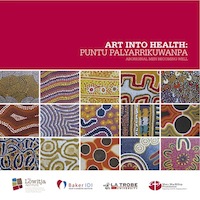Art into Health: Puntu Palyarrikuwanpa [Aboriginal Men Becoming Well]
An illustrated colour booklet Art into Health: Puntu Palyarrikuwanpa [Aboriginal Men Becoming Well] was published by the Lowitja Institute in 2011 to accompany a collection of paintings by Aboriginal men from Western Australia’s arid north-west that were exhibited in Perth during September 2011. The booklet includes commentaries by three Aboriginal leaders in health, Dr Mick Adams, Dr Mark Wenitong and Dr Alex Brown.
The paintings, created between 2002 and 2011, constitute a unique collection of art where, for the first time, a group of older, middle-aged and young Aboriginal men offer perspectives on their lives and wellbeing. Using contemporary techniques and methods, the artists present a wide range of narratives that link ancient ways of understanding and describing their world and wellbeing today. The collection provides an important and valuable body of knowledge about the health of Aboriginal men living in remote desert regions.
The booklet and the exhibition were compiled and curated by Dr Brian McCoy, a Senior Research Fellow in Aboriginal and Torres Strait Islander Health at La Trobe University, with support from the Baker IDI and the Mary MacKillop Foundation. Dr McCoy was Project Leader for the CRC for Aboriginal Health research collaboration ‘Developing, Sustaining and Evaluating Health Programs for Aboriginal Men’, which aimed to identify the key factors underlying the desert men’s health and wellbeing, and to provide support for the men to share their stories.
The Art into Health: Puntu Palyarrikuwanpa [Aboriginal Men Becoming Well] exhibition was hung in the lobby of Perth’s Pan Pacific Hotel from 17 to 23 September 2011 and featured 15 works by men from the Kutjungka region, south of Halls Creek, Western Australia. It was timed to coincide with three national conferences: the 6th National Aboriginal and Torres Strait Islander Male Health Convention, the 9th National Men’s Health Conference and the 5th National Men and Family Relationships Forum.
In preparation for the exhibition, the art was carefully packaged in Melbourne, then transported by road to Adelaide and from there by train to Perth. The exhibition provided a novel way for those attending the conferences, and other hotel guests, to gain an insight into Aboriginal men’s health issues through the creative lens of the male artists with their different ages, languages and community backgrounds.
Related resources:
- McCoy, B. F. 2011, Art into Health: Puntu Palyarrikuwanpa (Aboriginal Men Becoming Well), The Lowitja Institute, Melbourne
- CRCAH project: Developing, Sustaining and Evaluating Health Programs for Aboriginal Men
- Edmonds, F. with Clarke. M. 2009, Sort of Like Reading a Map’ – A Community Report on the Survival of South-East Australian Aboriginal Art Since 1834, CRCAH, Darwin
- McCoy, B. F. 2008, Holding Men: Kanyirninpa and the Health of Aboriginal Men, Aboriginal Studies Press, Canberra


